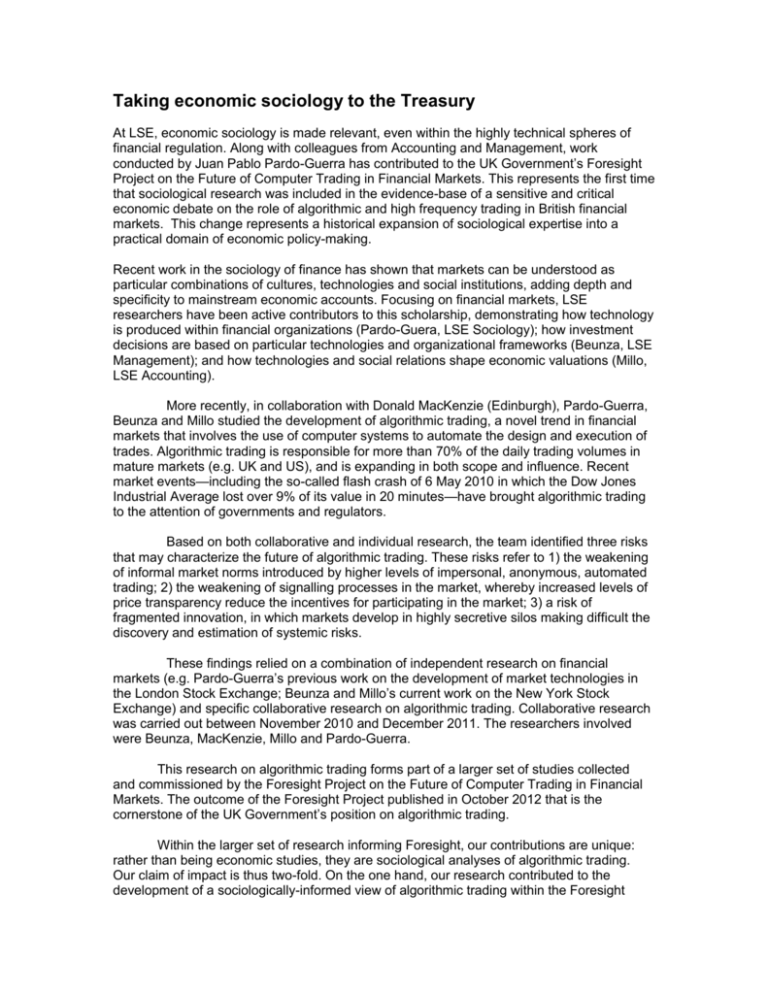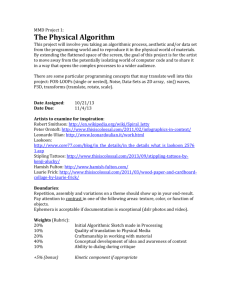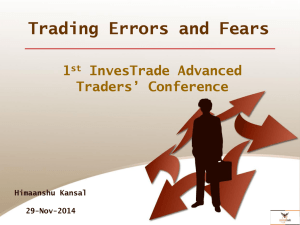Taking economic sociology to the Treasury
advertisement

Taking economic sociology to the Treasury At LSE, economic sociology is made relevant, even within the highly technical spheres of financial regulation. Along with colleagues from Accounting and Management, work conducted by Juan Pablo Pardo-Guerra has contributed to the UK Government’s Foresight Project on the Future of Computer Trading in Financial Markets. This represents the first time that sociological research was included in the evidence-base of a sensitive and critical economic debate on the role of algorithmic and high frequency trading in British financial markets. This change represents a historical expansion of sociological expertise into a practical domain of economic policy-making. Recent work in the sociology of finance has shown that markets can be understood as particular combinations of cultures, technologies and social institutions, adding depth and specificity to mainstream economic accounts. Focusing on financial markets, LSE researchers have been active contributors to this scholarship, demonstrating how technology is produced within financial organizations (Pardo-Guera, LSE Sociology); how investment decisions are based on particular technologies and organizational frameworks (Beunza, LSE Management); and how technologies and social relations shape economic valuations (Millo, LSE Accounting). More recently, in collaboration with Donald MacKenzie (Edinburgh), Pardo-Guerra, Beunza and Millo studied the development of algorithmic trading, a novel trend in financial markets that involves the use of computer systems to automate the design and execution of trades. Algorithmic trading is responsible for more than 70% of the daily trading volumes in mature markets (e.g. UK and US), and is expanding in both scope and influence. Recent market events—including the so-called flash crash of 6 May 2010 in which the Dow Jones Industrial Average lost over 9% of its value in 20 minutes—have brought algorithmic trading to the attention of governments and regulators. Based on both collaborative and individual research, the team identified three risks that may characterize the future of algorithmic trading. These risks refer to 1) the weakening of informal market norms introduced by higher levels of impersonal, anonymous, automated trading; 2) the weakening of signalling processes in the market, whereby increased levels of price transparency reduce the incentives for participating in the market; 3) a risk of fragmented innovation, in which markets develop in highly secretive silos making difficult the discovery and estimation of systemic risks. These findings relied on a combination of independent research on financial markets (e.g. Pardo-Guerra’s previous work on the development of market technologies in the London Stock Exchange; Beunza and Millo’s current work on the New York Stock Exchange) and specific collaborative research on algorithmic trading. Collaborative research was carried out between November 2010 and December 2011. The researchers involved were Beunza, MacKenzie, Millo and Pardo-Guerra. This research on algorithmic trading forms part of a larger set of studies collected and commissioned by the Foresight Project on the Future of Computer Trading in Financial Markets. The outcome of the Foresight Project published in October 2012 that is the cornerstone of the UK Government’s position on algorithmic trading. Within the larger set of research informing Foresight, our contributions are unique: rather than being economic studies, they are sociological analyses of algorithmic trading. Our claim of impact is thus two-fold. On the one hand, our research contributed to the development of a sociologically-informed view of algorithmic trading within the Foresight Project, which fed into the formulation of policy. On the other hand, our research highlighted the worth of sociological studies to both policy-makers and market practitioners.







